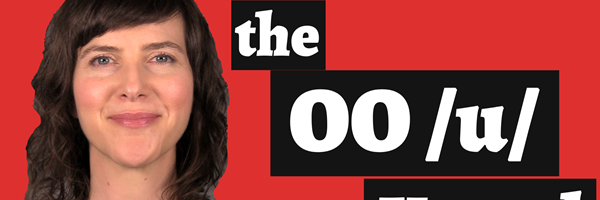(Video Transcript)
The American English UH /ʊ/ Vowel
The UH /ʊ/ vowel is in the words book, could, and put. UH. This vowel is considered to be a lax vowel, which means the lips, tongue, and mouth are relaxed when you say this sound. You should be able to feel the difference in muscular tension if you place your hand under your chin and say UH. Now say a tense vowel, like the OO /u/ vowel. OO. You should feel more muscular tension under the chin and in the mouth with OO than you do with UH.
Let’s take a closer look at the UH vowel by itself and in the word book.
How to make the UH /ʊ/ vowel
To make the UH vowel, the jaw opens but not that much. The back of the tongue is high in the mouth, and the tongue tip can either be down behind the bottom front teeth or resting just above the bottom front teeth. The lips are in a rounded shape, and they push away from the teeth. The muscles are relaxed.
Now you’ll see the UH vowel in the word book. Notice how the lips are rounded and push away from the teeth.
UH /ʊ/ vs. OO /u/
Some of my clients have difficulty with the UH vowel and the OO vowel. But watch my lips as I say these vowels. UH. OO. UH. OO. The UH vowel has pursed lips that push away from the teeth, and the muscles are more relaxed. The OO vowel has lips that round into a tight circle, and the muscles are more tense.
UH /ʊ/ before the Dark L
When the UH vowel comes before the Dark L sound, like in the word full, something happens to the vowel. It doesn’t sound like a pure UH vowel. Listen to the difference: book, full, book, full. Boh, uh, uh, book. Fuh, fuh, uh, full. This is because the Dark L sound influences the way the vowel is pronounced. The tongue anticipates that a Dark L sound is coming, so it will pull back into the mouth as you say the vowel in preparation for the Dark L sound. This process is called coarticulation, and it happens anytime when sounds come next to each other in a word. Sometimes you can’t hear the effects of coarticulation in a word, but other times the effect is very noticeable, like it is in the word full.
Stressed UH /ʊ/ vs. unstressed UH /ʊ/
When the UH vowel is in a stressed syllable, the pitch of the voice glides up and then down, and the syllable can be said longer and louder. UH. Book. But when UH is in an unstressed syllable, the pitch of the voice is usually flatter, and the syllable can be said faster and lower. UH. This is common in American English. Unstressed syllables are said faster than stressed syllables. This is how American English gets its rhythm - the back-and-forth between stressed syllables and unstressed syllables. The UH vowel is unstressed in a word like neighborhood.
On the left is the stressed UH vowel in the word book, and on the right is the unstressed UH vowel in the word neighborhood. Notice how the lips are pursed and pushed away from the teeth with both vowels, but the stressed position has tighter lip rounding than the unstressed position.
Stressed UH. Book. UH.
Unstressed UH. Neighborhood. UH.
Practice words and sentences
Here are some practice words and sentences.
Good. UH. Good.
You did a good job on that report!
Cook. UH. Cook.
My husband is a better cook than I am.
Sugar. UH. Sugar.
I don’t eat a lot of sugar anymore.
Woman. UH. Woman.
She’s a very intelligent woman.
Pudding. UH. Pudding.
The proof is in the pudding.
Thanks so much for watching! And I'd love to hear from you - contact me to learn how we can work together to perfect your American English pronunciation!



